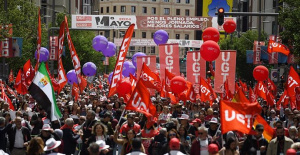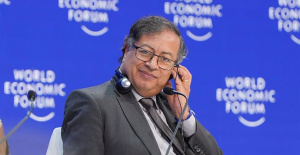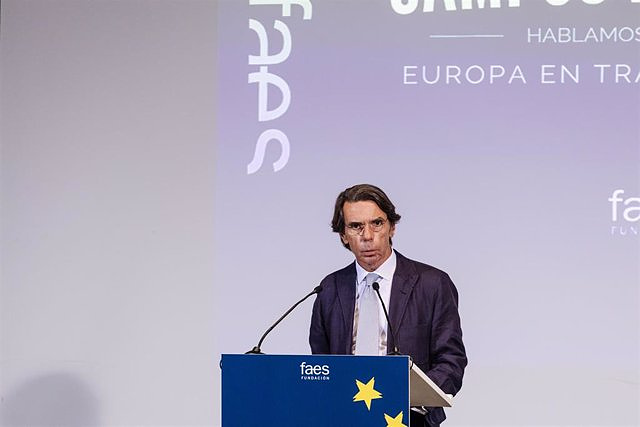The foundation says that Sánchez's invocation of González and Suárez to justify his changes of opinion also "fails"
MADRID, 17 Dic. (EUROPA PRESS) -
The Foundation for Analysis and Social Studies (FAES) has responded to the head of the Executive, Pedro Sánchez, that the 1,400 pardons granted by the Government of José María Aznar - among which there were rebels or those convicted of Filesa - affected people that "they did not appoint or remove presidents." What's more, he has stressed that they were "individual and personally motivated legal acts", without it being in exchange for a personal benefit for the PP or the then president.
"None of the pardoned people had any political capacity, they did not appoint or remove presidents, nor did they ever demonstrate any political will favorable to Aznar and conditional on the granting of his pardon, nor did they establish any negotiations with the PP aimed at favoring him. Aznar did not nor did the PP win anything," says FAES.
This is how the foundation has responded to the statements that Pedro Sánchez has used these days to justify the amnesty law, comparing that norm with the more than a thousand pardons in a single day granted by the PP Executive. "Aznar pardoned 1,400 people in one day and met with ETA in Switzerland," he proclaimed a week ago.
Specifically, on December 1, 2000, the Council of Ministers approved the granting of 1,443 pardons of the total of 3,000 whose resolution was pending in the Ministry of Justice, in response to two requests from the Holy See on the occasion of Jubilee 2000 "so that the Government of Spain made a gesture of sensitivity, generosity and forgiveness towards the reintegration of the convicted," as explained by the then Minister of Justice, Ángel Acebes. A total of 460 were rebels.
Among the batch of pardons granted by the Government was that of former judge Javier Gómez de Liaño, disqualified for 15 years for a crime of prevarication; convicted for the "Filesa case" such as Alberto Flores, Luis Oliveró and Carlos Navarro; convicted in relation to PER agricultural aid, and several public officials such as the mayor of Burgos, José María Peña, convicted of prevarication and whose votes had helped Aznar become president in Castilla y León years before.
The Aznar Government then justified itself by ensuring that it had followed a request from the Holy See with objective criteria. However, the measure caused a lot of commotion and, in fact, the then head of the opposition, José Luis Rodríguez Zapatero, demanded the appearance of the Minister of Justice and the Attorney General to explain the reasons for these pardons.
In an extensive analysis titled 'The vote under the stone. 20 years of Tinell' signed by PP Madrid deputy Miguel Ángel Quintanilla, FAES emphasizes that Aznar's pardons are not like what "is being negotiated with Puigdemont." "Apart from the fact that the pardon is not negotiated between the one who gives it and the one who receives it, much less the one who receives it imposes it on the one who gives it in exchange for a personal benefit," he adds.
For this reason, he emphasizes that, regarding Sánchez's argument of "more than a thousand pardons in one day" as a "direct antecedent equivalent to the amnesty", the foundation highlights that it is "obvious that a thousand legal acts are not equivalent to a large illegal act and "A thousand acts of personal scope are not equivalent to one act of general scope."
"Approving a thousand students after examining and grading them one by one is not like a general pass without an exam for anyone. A thousand pardons are not an amnesty, just as a thousand reasoned passes are not a general pass, because their legal or academic basis is a thousand times different," points out FAES, which cites in its document some examples of these pardons, such as a person who refused to perform military service sentenced to six months in prison and disqualification for 10 years or two perpetrators of a crime of theft.
What's more, the foundation recalls that those 1,400 pardons were approved "months after the elections that the PP won by an absolute majority in March 2000 and months after Aznar's second inauguration, and they were not a single one-day act but a myriad of individual and personally motivated legal acts developed over a long period of time.
According to FAES, not only does Sánchez's invocation of Aznar "fail", but the one made to former presidents Adolfo Suárez and Felipe González "also fails", mentioned as proof that "changes of opinion due to responsibility and commitment to general interest are not a rarity for Sánchez and should not be criticized".
Thus, in the case of Suárez and regarding the legalization of the PCE, the foundation reminds Sánchez that it occurred "in compliance with the ruling of the Fourth Chamber of the Supreme Court of April 1, 1977 and in view of the opinion of the kingdom's prosecutor ". Furthermore, he indicates that Suárez "legalized a party that was clearly opposed to his own personal political positions and on which he did not depend," in a move that was "good for the budding system" but "not exactly for him personally."
In the case of González, he remembers that "he changed his mind about Spain's permanence in NATO" and "it can be assumed that it was an informed decision that matured slowly." In his opinion, "there is no evidence" that the former socialist president "needed that change of position to be invested, nor that he obtained a tangible and immediate personal or partisan political advantage."
FAES also recalls that the Tinell Pact of December 14, 2003 was "the true factory of nationalists, designed and implemented in a Catalonia that was experiencing the moment of lowest nationalist tension in a long time."
Based on the political and social consequences of that agreement, the reinforcement vote that socialism needed to reach La Moncloa "from the extreme" germinated, according to the foundation. What's more, he assures that "the growth of the left-wing, radical and nationalist vote in Catalonia since 2003 has been decisive in the investitures of Zapatero and Pedro Sánchez."
"Having tilted the Catalan board towards radicalism has also allowed the PSC an appearance of moderate refuge to which Vox has made priceless contributions during the last campaign," he assures, to emphasize that "the extra balls" that Santiago Abasacal's men "have brought to Spanish politics have all been for Sánchez".
According to FAES, the Tinell pact, which was "the great socialist electoral and ideological bet after losing the center and deciding not to return to it," is "the cause of the amnesty, as it was for the 2011 coup,7 a pact for the explicit exclusion of the PP as a necessary step for a constitutional mutation, to change it outside of procedures and institutions."
Finally, the foundation highlights that Pedro Sánchez is "legitimately" president, but "he is not the only legitimate power." "The opposition is also legitimate, the courts are legitimate, the media is legitimate. Parliament, of course, is legitimate," he highlights.

 Exploring Cardano: Inner Workings and Advantages of this Cryptocurrency
Exploring Cardano: Inner Workings and Advantages of this Cryptocurrency Seville.- Economy.- Innova.- STSA inaugurates its new painting and sealing hangar in San Pablo, for 18 million
Seville.- Economy.- Innova.- STSA inaugurates its new painting and sealing hangar in San Pablo, for 18 million Innova.- More than 300 volunteers join the Andalucía Compromiso Digital network in one month to facilitate access to ICT
Innova.- More than 300 volunteers join the Andalucía Compromiso Digital network in one month to facilitate access to ICT Innova.-AMP.- Ayesa acquires 51% of Sadiel, which will create new technological engineering products and expand markets
Innova.-AMP.- Ayesa acquires 51% of Sadiel, which will create new technological engineering products and expand markets COMUNICADO: Energy Transitions Commission (ETC) Urges Government and Industry Collaboration to Overcome Perceptions of Offshore Wind
COMUNICADO: Energy Transitions Commission (ETC) Urges Government and Industry Collaboration to Overcome Perceptions of Offshore Wind UGT and CCOO demand the regeneration of democracy, better salaries and a reduction in working hours
UGT and CCOO demand the regeneration of democracy, better salaries and a reduction in working hours Alcaraz gives up his reign in Madrid against Rublev
Alcaraz gives up his reign in Madrid against Rublev Petro announces that Colombia will break diplomatic relations with Israel
Petro announces that Colombia will break diplomatic relations with Israel How Blockchain in being used to shape the future
How Blockchain in being used to shape the future Not just BTC and ETH: Here Are Some More Interesting Coins Worth Focusing on
Not just BTC and ETH: Here Are Some More Interesting Coins Worth Focusing on Ivace and promotes a less invasive device for the early detection of prostate cancer
Ivace and promotes a less invasive device for the early detection of prostate cancer Valencia unanimously approves the ordinance to allocate spaces to test innovative initiatives
Valencia unanimously approves the ordinance to allocate spaces to test innovative initiatives UPV researchers promote a paid master's degree as a "talent factory" in integrated photonics
UPV researchers promote a paid master's degree as a "talent factory" in integrated photonics A spin-off of the UV works on obtaining high-resolution 3D biomedical images in real time
A spin-off of the UV works on obtaining high-resolution 3D biomedical images in real time A million people demonstrate in France against Macron's pension reform
A million people demonstrate in France against Macron's pension reform Russia launches several missiles against "critical infrastructure" in the city of Zaporizhia
Russia launches several missiles against "critical infrastructure" in the city of Zaporizhia A "procession" remembers the dead of the Calabria shipwreck as bodies continue to wash up on the shore
A "procession" remembers the dead of the Calabria shipwreck as bodies continue to wash up on the shore Prison sentences handed down for three prominent Hong Kong pro-democracy activists
Prison sentences handed down for three prominent Hong Kong pro-democracy activists ETH continues to leave trading platforms, Ethereum balance on exchanges lowest in 3 years
ETH continues to leave trading platforms, Ethereum balance on exchanges lowest in 3 years Investors invest $450 million in Consensys, Ethereum incubator now valued at $7 billion
Investors invest $450 million in Consensys, Ethereum incubator now valued at $7 billion Alchemy Integrates Ethereum L2 Product Starknet to Enhance Web3 Scalability at a Price 100x Lower Than L1 Fees
Alchemy Integrates Ethereum L2 Product Starknet to Enhance Web3 Scalability at a Price 100x Lower Than L1 Fees Mining Report: Bitcoin's Electricity Consumption Declines by 25% in Q1 2022
Mining Report: Bitcoin's Electricity Consumption Declines by 25% in Q1 2022 Oil-to-Bitcoin Mining Firm Crusoe Energy Systems Raised $505 Million
Oil-to-Bitcoin Mining Firm Crusoe Energy Systems Raised $505 Million Microbt reveals the latest Bitcoin mining rigs -- Machines produce up to 126 TH/s with custom 5nm chip design
Microbt reveals the latest Bitcoin mining rigs -- Machines produce up to 126 TH/s with custom 5nm chip design Bitcoin's Mining Difficulty Hits a Lifetime High, With More Than 90% of BTC Supply Issued
Bitcoin's Mining Difficulty Hits a Lifetime High, With More Than 90% of BTC Supply Issued The Biggest Movers are Near, EOS, and RUNE during Friday's Selloff
The Biggest Movers are Near, EOS, and RUNE during Friday's Selloff Global Markets Spooked by a Hawkish Fed and Covid, Stocks and Crypto Gain After Musk Buys Twitter
Global Markets Spooked by a Hawkish Fed and Covid, Stocks and Crypto Gain After Musk Buys Twitter Bitso to offset carbon emissions from the Trading Platform's ERC20, ETH, and BTC Transactions
Bitso to offset carbon emissions from the Trading Platform's ERC20, ETH, and BTC Transactions Draftkings Announces 2022 College Hoops NFT Selection for March Madness
Draftkings Announces 2022 College Hoops NFT Selection for March Madness























